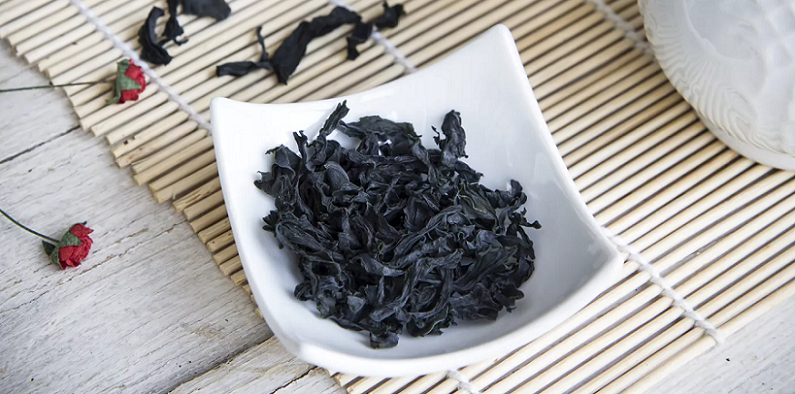
If you’re in the pursuit of a healthier lifestyle, you might have come across a plethora of advice on diet, exercise, and various supplements. Here we dive into something a bit different – Fucoxanthin, a compound found in brown seaweed that’s making waves for its potential in weight management.
Contents
What is Fucoxanthin?
Fucoxanthin is a carotenoid, which means it belongs to the same family as beta-carotene and lycopene. Carotenoids are pigments responsible for the vibrant colors in fruits and vegetables. Specifically, Fucoxanthin is the pigment that gives brown seaweed its characteristic color and is found in various marine algae. Its potential health benefits, particularly in the realm of weight management, have ignited interest among researchers and health enthusiasts alike.
Origin and Natural Occurrence
Fucoxanthin is primarily found in brown seaweed, but it’s also present in other marine sources. Let’s dive into the specific types of seaweed and marine algae where Fucoxanthin is abundant, and take a brief look at its natural habitat.
Brown Seaweed Species
Among the various species of brown seaweed, wakame (Undaria pinnatifida) and kelp (Laminaria japonica) are particularly rich in Fucoxanthin. These seaweeds are commonly used in Asian cuisine, especially in countries like Japan, Korea, and China.
Other Marine Sources
Apart from brown seaweed, Fucoxanthin can also be found in other marine algae such as diatoms. However, brown seaweed remains the most significant and accessible source for human consumption.
Chemical Structure and Properties
Diving into the science, Fucoxanthin is a xanthophyll, which is a type of oxygenated carotenoid. Its chemical structure is characterized by an unusual allenic bond and a conjugated carbonyl group, which are believed to play a significant role in its biological activities. This unique structure allows Fucoxanthin to exhibit antioxidant properties, and it’s this capacity to combat oxidative stress that is thought to contribute to its potential weight management benefits.
Historical Uses of Brown Seaweed in Diet
Before Fucoxanthin became a focal point of research, brown seaweed had been a part of traditional diets for centuries, particularly in East Asia. In Japan, for example, wakame and kelp are key ingredients in miso soup, a dish that’s a staple in Japanese cuisine. In addition to being a source of flavor, the seaweed was valued for its potential health-promoting properties, including improving digestion and supporting thyroid function due to its iodine content. The recent focus on Fucoxanthin adds another dimension to the historical significance of brown seaweed in traditional diets [1].

How Does Fucoxanthin Aid in Weight Management?
Now that we have a foundation of knowledge on what Fucoxanthin is, let’s delve into the heart of the matter – how it can be an ally in weight management. The potential of Fucoxanthin in aiding weight management lies in its impact on various metabolic processes.
Mechanisms of Action
Fucoxanthin influences several metabolic processes which are critical to weight management. These include the rate of metabolism, the oxidation of fats, regulation of blood sugar levels, and modulation of hormones involved in hunger and fat storage [2].
Increasing Metabolic Rate
One of the ways Fucoxanthin may help with weight management is by increasing the metabolic rate. It has been found to enhance the activity of uncoupling protein 1 (UCP1) in fat tissues. UCP1 is involved in the expenditure of energy, and its increased activity can lead to higher calorie burning, even when the body is at rest.
Fat Oxidation
Fucoxanthin can also aid in the oxidation of fats, a process where fatty acids are broken down for energy. This means that instead of storing fats, the body utilizes them more efficiently, which is beneficial for weight loss.
Modulating Blood Sugar Levels
By helping to stabilize blood sugar levels, Fucoxanthin may curb the desire for snacking and overeating. This is particularly helpful in preventing weight gain and assisting in weight loss, especially for individuals with fluctuating blood sugar levels.
Regulating Leptin and Adiponectin Levels
Fucoxanthin has been found to influence levels of leptin, a hormone that regulates hunger, and adiponectin, a hormone that modulates glucose regulation and fatty acid breakdown. By modulating these hormones, Fucoxanthin can potentially affect appetite and how the body stores and uses fats [3].
Fucoxanthin vs. Other Weight Management Compounds
While there are several compounds and supplements touted for weight management, Fucoxanthin has certain advantages. Its natural origin and antioxidant properties are among the factors that make it attractive. Additionally, it does not appear to have the stimulant effects that are common in many weight loss supplements, which means it may be less likely to cause jitteriness or affect sleep patterns.
Studies and Clinical Trials
Understanding the scientific evidence behind Fucoxanthin’s role in weight management is essential. Here, we will briefly review what animal and human studies have revealed.
Animal Studies
Several animal studies have shown promising results regarding the use of Fucoxanthin for weight management. For example, studies in mice have shown that Fucoxanthin can reduce weight gain on a high-fat diet and improve insulin sensitivity [4].
Human Studies
Human studies, though fewer in number, have also shown positive results. A study published in the Journal of Obesity found that a combination of Fucoxanthin and pomegranate seed oil led to a reduction in liver fat content and body weight in obese, non-diabetic women [5].

Benefits of Fucoxanthin for Overall Health
As we unravel the potential of Fucoxanthin in weight management, it is important to recognize that this brown seaweed compound may offer a range of other health benefits. From its antioxidant and anti-inflammatory properties to potential roles in cancer prevention and cardiovascular health, Fucoxanthin’s spectrum of benefits warrants attention [6].
Antioxidant Properties
Fucoxanthin’s antioxidant properties are among its most noteworthy attributes. As an antioxidant, it helps combat oxidative stress, which is caused by an imbalance between the production of reactive oxygen species and the body’s ability to counteract their harmful effects. Oxidative stress is implicated in the aging process and various chronic diseases, so antioxidants like Fucoxanthin can be essential for long-term health.
Anti-Inflammatory Effects
Chronic inflammation is a root cause of many health issues. Fucoxanthin has been found to exhibit anti-inflammatory effects by inhibiting the production of pro-inflammatory cytokines. This may contribute to reducing the risk of inflammatory conditions such as arthritis, and also plays a role in preventing chronic diseases related to inflammation.
Potential Role in Cancer Prevention
Exciting research has indicated that Fucoxanthin might play a role in cancer prevention. Studies have shown that it can induce apoptosis (programmed cell death) in cancer cells and inhibit the growth of tumors. While this research is still in early stages, the potential for Fucoxanthin to be a part of cancer-preventive strategies is an area of great interest [7].
Cardiovascular Health
The heart and blood vessels benefit from Fucoxanthin as well. Its ability to improve lipid profiles and reduce the accumulation of atherosclerotic plaques makes it a potential ally in maintaining cardiovascular health. By helping to lower bad cholesterol levels and prevent the hardening of arteries, Fucoxanthin may contribute to a healthier heart.
Supporting Liver Health
A healthy liver is essential for overall well-being. Fucoxanthin has shown promise in supporting liver health, particularly in the context of non-alcoholic fatty liver disease (NAFLD). By reducing liver fat accumulation and improving metabolic markers, Fucoxanthin might be beneficial for those looking to improve liver function.
Possible Neuroprotective Effects
Emerging research suggests that Fucoxanthin might have neuroprotective effects. Though the research is preliminary, there is evidence to suggest that it can protect brain cells from oxidative stress and might be beneficial in neurological conditions like Alzheimer’s disease [8].

Incorporating Fucoxanthin Into Your Diet
With a greater understanding of Fucoxanthin’s potential benefits for weight management and overall health, you may be eager to include it in your diet. However, it is crucial to approach this with careful consideration. This section will guide you on how to incorporate Fucoxanthin through food sources and supplements, while also addressing the recommended dosages and precautions.
Through Food Sources
One of the most natural ways to include Fucoxanthin in your diet is through food sources, primarily brown seaweed. Here are some common types of brown seaweed and ways to incorporate them into meals.
Wakame
Wakame is a type of brown seaweed that is often used in soups and salads. You can add dried wakame to miso soup or rehydrate it to use in seaweed salads. It’s not only a source of Fucoxanthin but also rich in vitamins and minerals.
Kelp
Kelp can be used in a variety of dishes. Kelp noodles are a popular low-calorie alternative to traditional noodles. You can also use kelp in powdered form as a seasoning to add a umami flavor to dishes.
Through Supplements
If incorporating seaweed into your diet is not feasible or appealing, Fucoxanthin is also available in supplement form.
Types of Supplements
Fucoxanthin supplements are available as capsules, tablets, or powders. Some supplements may combine Fucoxanthin with other ingredients, such as pomegranate seed oil, which has been shown to enhance its bioavailability and efficacy.
Choosing a Quality Supplement
When selecting a Fucoxanthin supplement, it is important to choose a reputable brand. Look for third-party testing and certifications to ensure the product’s purity and potency.
Recommended Dosage and Precautions
When incorporating Fucoxanthin into your diet, either through food or supplements, it’s important to be mindful of the dosage and any potential precautions.
Dosage Guidelines
There is no established recommended daily intake for Fucoxanthin. However, most studies have used doses ranging from 2.4 to 8 mg per day. It’s best to start with a lower dose and consult a healthcare professional for personalized advice.
Interactions and Side Effects
Fucoxanthin is generally considered safe when consumed in moderate amounts through food. However, when taking supplements, it’s important to be aware of potential interactions with medications, especially anticoagulants and antiplatelet drugs. Also, as with any supplement, there is a potential for side effects. If you experience any adverse reactions, it’s important to discontinue use and consult a healthcare professional.
Precautions and Potential Side Effects
While Fucoxanthin has shown promise in weight management and various aspects of health, it’s imperative to approach its use with caution.
Considerations Before Use
Before you start taking Fucoxanthin, there are a few considerations to keep in mind to ensure that its use is appropriate for your health profile.
Medical History and Medication Use
If you have a history of thyroid disorders, are on blood-thinning medications, or have any other significant medical conditions, it’s essential to consult a healthcare professional before using Fucoxanthin. This is to ensure that there are no contraindications or potential interactions with medications you may be taking [9].
Pregnancy and Breastfeeding
There is limited information on the safety of Fucoxanthin during pregnancy and breastfeeding. Therefore, it is advisable for pregnant and breastfeeding women to avoid using Fucoxanthin supplements unless advised by a healthcare professional.
Potential Side Effects
Like any compound, Fucoxanthin can cause side effects in some individuals. Understanding these potential side effects can help you make informed decisions and take appropriate action if needed.
Allergic Reactions
In rare cases, individuals may experience an allergic reaction to Fucoxanthin or to the seaweed from which it is derived. Signs of an allergic reaction include hives, difficulty breathing, or swelling of the face, lips, tongue, or throat.
Gastrointestinal Discomfort
Some individuals may experience gastrointestinal discomfort, including nausea, diarrhea, or stomach cramps, especially when taking Fucoxanthin in supplement form.
Effects on Thyroid Function
Since seaweed is naturally high in iodine, excessive consumption of Fucoxanthin from seaweed sources could affect thyroid function. It’s important to monitor iodine intake, especially for individuals with thyroid disorders.
Unknown Long-Term Effects
The long-term effects of Fucoxanthin supplementation are not well studied. Until more is known, it is wise to use Fucoxanthin with caution and under the supervision of a healthcare professional.
References
[1] Evaluation of Fucoxanthin Content in Popular Weight Loss Supplements
[2] Fucoxanthin: A Promising Medicinal and Nutritional Ingredient
[3] Fucoxanthin: A Promising Natural Compound for Weight Management
[4] Fucoxanthin: The most exciting new fat-burning carotenoid on the world’s supplement-ingredient stage
[5] Fucoxanthin: A review of potential benefits relative to human health
[6] Modulation of Gut Microbiota by Fucoxanthin During Alleviation of Obesity
[7] Reduction of HbA1c levels by fucoxanthin-enriched akamoku oil possibly involves the thrifty allele of uncoupling protein 1 (UCP1)
[8] Brown Seaweed Contains Promising Fat Fighter, Weight Reducer
[9] Seaweed Shrinks Belly Fat?






